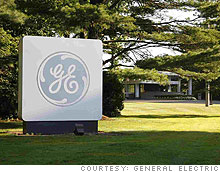GE sees signs of stabilization
Conglomerate has a rocky third quarter, but says it is beginning to recover along with the economy.
 |
| GE reported sinking profit and sales, but said it sees signs of stablization. |
NEW YORK (CNNMoney.com) -- General Electric Co. continued to get hammered by its troubled finance arm, but the conglomerate's widespread cost cutting and a strong showing from its consumer and industrial units helped GE's profit beat Wall Street's expectations.
The company said it was starting to turn around its finance unit GE Capital, and began to see signs of stabilization across the board.
"In a global economic environment that is beginning to slowly recover, GE delivered solid third-quarter business results," said Jeff Immelt, GE's chief executive, on a conference call with investors. "GE is well positioned in this reset economy."
The Fairfield, Conn.-based conglomerate said its third-quarter net income fell 44% to $2.4 billion, or 23 cents per share, for the period ended Sept. 30. Results included a charge of $600 million, or 5 cents per share for restructuring and cost cutting.
Without the charge, GE earned 28 cents per share. Analysts polled by Thomson Reuters, who typically exclude one-time items from their estimates, forecasted earnings of 20 cents per share.
Sales fell 20% to $37.8 billion, missing analysts' forecasts of $39.5 billion.
The company's infrastructure business has fared very well in the past year despite the deep economic recession. But much of the company has been rocked by the downturn, dragged by losses at finance arm GE Capital and struggling media unit NBC Universal. GE is expected to sell its majority stake in NBC in the coming months, perhaps to cable provider Comcast (CMCSA, Fortune 500).
"GE's operating performance has been uneven and its finance portfolio is a source of risk," said Jeffrey Sprague, Citigroup analyst, in a note written after GE reported its earnings. "We believe GE may have reached the point that its size and complexity have become a hindrance to effective management."
Shares of GE (GE, Fortune 500) dropped 70 cents, or 4%, in afternoon trading to $16.09. The stock fell below where it started the year at $16.20 per share, but it is well above its closing point of $6.66 set on March 5, which was an 18-year low.
GE Capital: Revenue from the company's finance arm fell 30% to $12.2 billion in the quarter, accounting for nearly a third of GE's overall revenue.
Immelt said the company has made "significant progress to make GE Capital safe and secure," shrinking the company ahead of schedule. He said that winding down had a negative impact on revenue, but serves as "an important part of our strategy."
Many analysts and GE investors have been pushing the company to scale back GE Capital even further and focus it more on vendor financing for corporate customers as opposed to consumer finance and real estate loans.
The unit was profitable in the third quarter, but earned just $263 million, down 87% from a profit of $2 billion during the same period last year. As in the second quarter, every segment of GE Capital was profitable except for the real estate unit, which lost $538 million in the third quarter.
Immelt said the company's real estate division "is experiencing a tough environment," but said "the risks are well understood and manageable."
"While it remains a tough environment for GE Capital, we are seeing signs of stabilization," Immelt said. "We have successfully navigated through the financial crisis and are preparing GE Capital to be a smaller, more focused franchise."
Other units: Sales dropped in all of the company's segments last quarter, but cost-cutting initiatives helped keep profits up for the most part.
NBC Universal's revenue fell 20% in the quarter, but profit rose 13% compared to last year. Sales from the energy infrastructure unit fell 9%, but earnings were up 11%. At the consumer and industrial division, sales fell 18% but profit rose nearly 149%.
Besides GE Capital, only the technology infrastructure unit had falling revenue and profit last quarter. Sales at the division were down 11% and earnings fell 8%.
The company was mum on any possible deals for NBC Universal, saying that it constantly evaluates its diverse portfolio of assets, but doesn't see an immediate need to sell any of them off.
GE holds an 80% stake in NBC, with French media company Vivendi holding the other 20%. Vivendi is believed to be interested in selling its stake in NBC, and GE said it may look to find a new partnership or allow Vivendi to sell its stake in a public offering.
"There has been a lot of speculation on NBC Universal, but in one way, shape or form, that's been the case for a long time," said Immelt. "I don't think we need to do any deals in the future ... but we want to be ready for a number of scenarios, including an IPO or a strategic partnership." ![]()

